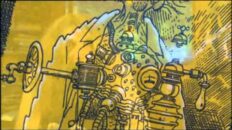It’s been almost four years to the day since Irish singer-songwriter Hozier released his self-titled debut album, Hozier. It was a delightful surprise recently to see a new EP, Nina Cried Power, released for general consumption. Comprised of only four songs, the album is a cross-section of Hozier’s unique blend of sultry folk R&B, rafter raising rock, and lilting acoustic guitar soul. This was my first impression upon hearing it, and is confirmed by Hozier’s own description of the album as “best looked at as a little bit of a sampler, four corners of the world the album populates.” A larger album awaits us in 2019 to fill in the gaps between these songs, and it’s been a long wait for Hozier’s much anticipated sophomore album.
The title track, “Nina Cried Power,” is an anthemic tribute to the gospel Rock and Roll fusion of the American Civil Rights Movement. In his words, the song is meant to talk about how “the civil liberties and civil rights that we do enjoy, the kind of common respect for the dignity of people that we take for granted now, is not something that was never given … It was something that was sweated for, and wept, and bled for.” Indeed, his repeated focus on doing and action in the opening lines of the song, “It’s not the waking it’s the rising” serve to remind us that in 2018, as in 1963, it’s not enough just to be woke. Once you wake up, you need to do something to make change happen. Nina Simone, James Brown, Billie Holliday, Mavis Staples, and countless other musicians that supported the Civil Rights Movement wedded the power of song to the power of action to enact change. Hozier seeks to both honor them and invoke their memory to energize a new generation of activists. It’s also a damn fun song. It’s a special touch as well that he partnered with legendary artist Mavis Staples, who lends the song not only her estimable R&B chops, but also the weight of history she brings with her, having been on the front lines of the original Civil Rights Movement the song pays tribute to. Hozier cries power, and it’s hard not to listen
“NFWMB” is a sultry, silky, beautiful song I plan to listen to over and over this winter with my fireplace roaring and a glass of smooth tequila in my hand. I can’t pretend to understand any deep insight into “Nothing Fucks With My Baby,” though it certainly has a nihilistic, end of the world sort of vibe to it that’s juxtaposed against the eerily calm demeanor of the song itself. It also seems to fit in with a larger theme Hozier is going for with the album as a whole world on fire. What I do know is that it’s hauntingly beautiful, and deserves repeat listens.
“Moment’s Silence (Common Tongue)” is probably my least favorite song of the brief album, but not because it’s bad. Of all of the songs on the album, it and “Shrike” feel the most like classic Hozier (as classic as you can get for only having one album). The lyrics are complex and deep, juxtaposing religious iconography and disapproval with purely sexual acts of physical intimacy with lovers. While it’s certainly provocative and a fun listen, it also feels a little derivative of the same lyrical structure of his original and still biggest hit, “Take Me to Church.” It’s not a bad song, I’m just looking for him to push the envelope a little more here lyrically.
“Shrike” feels very much like a follow up to “Cherry Wine,” a song written about domestic abuse. Musically it sounds similar, the same opening single guitar notes–although somehow pleasantly mournfully lilting now. The lyrics, following a bird metaphor of the Shrike–a bird known both for its piercing wail and its habit of killing smaller birds and impaling them on rows of thorns–plays out in gruesome bittersweet sadness. The lyrics depict someone who tried to escape a damaging relationship but finds himself sucked back in, unable to escape, leading to his eventual death. “I fled to the city with so much discounted, ah, but I’m flying like a bird to you now, back to the hedgerow where bodies lay mounted … as the shrike to your sharp and glorious thorn.” I may be mishearing, but there’s also a playful element here, as whenever Hozier sings the “sharp” lyric, he actually goes up a half step, literally singing the word as a sharp note. I’m sure other, more astute listeners will find even more layers of depth than I. Hozier has – in additional to his man other talents – the heart of a true poet.
After four years of waiting for a follow up to his freshman album, the sophomore effort remains months away. Nina Cried Power comes to us as the summer vacation album between these two efforts, and it was desperately needed to make the wait bearable. The pressure on him to produce a good follow up to the much loved, highly regarded self-titled Hozier, is immense. But to his credit, if these four songs are any indication of what’s to come on the full follow up effort, he will have cleared the hurdles in front of him with room to spare.








